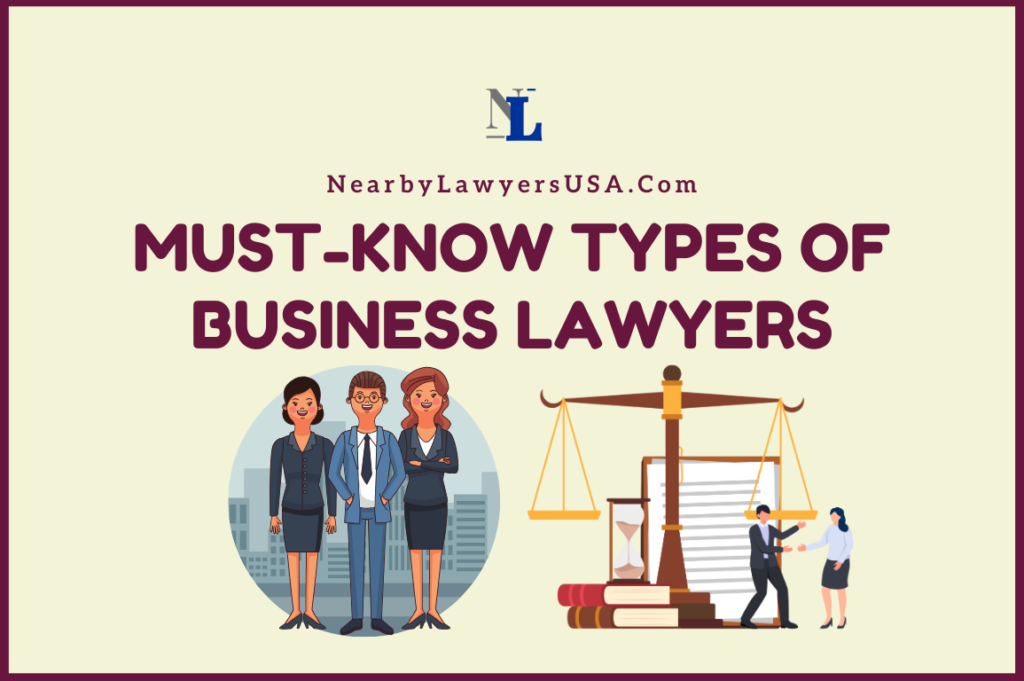Small business owners often juggle numerous tasks, from daily operations to client interactions. Amid these responsibilities, legal matters frequently take a back seat, but this can lead to disastrous consequences.
For any business, having the right legal support is critical to safeguarding operations, mitigating risks, and ensuring long-term success.
To make sure you have the right legal advice at hand, it’s crucial to understand the different types of lawyers who can offer specialized assistance.

Here are six essential types of business lawyers that every business should consider.
1. General Business Lawyer
A general business lawyer provides comprehensive legal guidance across multiple areas of business law. They are often the go-to option for businesses not dealing with highly specialized legal situations.
General business lawyers help with day-to-day legal matters like drafting contracts, negotiating deals, and ensuring regulatory compliance.
Their expertise covers a broad spectrum of issues, including corporate governance, commercial transactions, and compliance with local laws.
If you are uncertain about which legal professional to consult, a general business lawyer can serve as a trusted advisor, helping you navigate routine legal matters.
However, if your business faces more specific challenges, you may need the expertise of a specialized lawyer.
2. Employment and Labor Lawyer
Employment and labor laws are constantly evolving, and non-compliance can lead to costly lawsuits. If your business has employees, consulting with an employment and labor lawyer is crucial.
These legal experts specialize in ensuring that businesses comply with state and federal employment regulations.
They can draft employee handbooks, advise on hiring and termination practices, and help navigate workplace issues such as wrongful termination, discrimination, and sexual harassment claims.
An employment lawyer is also essential if you’re involved in labor disputes or need help negotiating collective bargaining agreements.
Their knowledge of employment laws and workplace standards can prevent disputes from escalating into expensive legal battles, safeguarding your business against employment-related risks.
3. Mergers and Acquisitions (M&A) Lawyer
When buying or selling a business, the legal complexities can be overwhelming. Mergers and acquisitions (M&A) lawyers specialize in guiding businesses through these transactions, from negotiating the terms of the deal to ensuring all legal documentation is in place.
They play a vital role in due diligence, guaranteeing that the acquiring company recognizes the financial and legal standing of the target business.
M&A lawyers can also address specific concerns, such as employee rights and intellectual property, that often arise during these transactions.
Their involvement ensures that both parties meet their legal obligations and minimizes the chances of disputes arising post-deal.
4. Tax Lawyer
Taxes are a complex area for any business, and even small errors can lead to legal problems. While CPAs handle much of the day-to-day tax work, there are times when a business needs the expertise of a tax lawyer.
Tax lawyers specialize in tax law and can offer crucial support during audits or when disputes arise with tax authorities.
A tax lawyer can help businesses with tax planning, ensuring compliance with complex tax codes, and representing them in court during disputes.
They are especially valuable when businesses face litigation or when large transactions have significant tax implications. The right tax lawyer will ensure your business avoids costly mistakes and remains compliant with all tax obligations.
5. Intellectual Property (IP) Lawyer
In today’s competitive marketplace, intellectual property (IP) is often one of the most valuable assets a business owns. If your company deals with trademarks, patents, copyrights, or trade secrets, an intellectual property lawyer is indispensable.
They can help you protect these assets, ensuring your brand, innovations, and proprietary information are legally secure.
An IP lawyer assists with filing patents, registering trademarks, and drafting contracts related to intellectual property. They also help prevent or resolve infringement claims, ensuring your business doesn’t inadvertently violate someone else’s IP rights.
Protecting your intellectual property is vital for maintaining a competitive edge and avoiding costly legal disputes.
6. Contract Lawyer
Contracts form the foundation of most business transactions, whether it’s with suppliers, clients, or employees. However, relying on generic templates found online may leave your business exposed to legal risks.
A contract lawyer can help draft, review, and negotiate contracts, ensuring that they protect your business’s interests and avoid potential pitfalls.
Contract lawyers have specialized knowledge in creating legally sound agreements that are customized to your specific business needs.
They ensure that contracts include all necessary provisions, such as terms and conditions, warranties, liability clauses, and more. Having a contract lawyer on your team can save you from future disputes and provide the legal protection your business requires.
Potential Legal Challenges and the Role of Specialized Lawyers
As a business owner, you’re likely to face various legal challenges throughout the life of your company. Understanding which lawyer you need for each situation can help you address these challenges effectively.
- General Business Issues: A general business lawyer can assist with most routine legal matters, such as contract disputes or compliance issues, with minimal risk of major financial consequences.
- Employment Law: Employment disputes, such as wrongful termination or harassment claims, are common and can lead to significant legal costs if not handled properly. An employment lawyer can mitigate these risks and keep your business compliant.
- Intellectual Property Disputes: While less frequent, IP disputes can have a substantial financial impact. Infringement lawsuits can lead to costly settlements, so having an IP lawyer on your team is crucial if your business relies on intangible assets.
- Contractual Obligations: Contracts that aren’t legally sound can expose your business to litigation or costly obligations. A contract lawyer ensures that your agreements are tailored to your business and protect you from unforeseen liabilities.
- Mergers and Acquisitions: While M&A transactions are less common, the financial stakes are often higher. Legal disputes in this area can be complex and costly, making the expertise of an M&A lawyer invaluable.
Every business, regardless of size, benefits from having the right legal support. Whether you need help with day-to-day operations or are facing a specific legal challenge, understanding the types of business lawyers available can make all the difference.
From general business lawyers to tax and IP specialists, each plays a critical role in protecting your business’s interests and ensuring legal compliance.
Hiring specialized legal counsel may seem like a significant investment upfront, but it can save your business from costly legal problems down the road.
By choosing the right lawyer for your business’s specific needs, you’ll not only protect your company but also ensure its growth and success in an increasingly complex legal environment.





